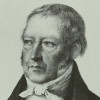“ Any object indeed is faulty and imperfect when it is only inward, and thus at the same time only outward, or, (which is the same thing,) when it is only an outward and thus only an inward. For instance, a child, taken in the gross as human being, is no doubt a rational creature; but the reason of the child as child is at first a mere inward, in the shape of his natural ability or vocation, &c. ”
Georg Wilhelm Friedrich Hegel, Science of Logic (1816). copy citation
| Author | Georg Wilhelm Friedrich Hegel |
|---|---|
| Source | Science of Logic |
| Topic | reason doubt |
| Date | 1816 |
| Language | English |
| Reference | |
| Note | Translated by William Wallace |
| Weblink | http://www.gutenberg.org/files/55108/55108-h/55108-h.htm |
Context
“Those who look upon the essence of nature as mere inwardness, and therefore inaccessible to us, take up the same line as that ancient creed which regarded God as envious and jealous; a creed which both Plato and Aristotle pronounced against long ago. All that God is, He imparts and reveals; and He does so, at first, in and through nature.
Any object indeed is faulty and imperfect when it is only inward, and thus at the same time only outward, or, (which is the same thing,) when it is only an outward and thus only an inward. For instance, a child, taken in the gross as human being, is no doubt a rational creature; but the reason of the child as child is at first a mere inward, in the shape of his natural ability or vocation, &c. This mere inward, at the same time, has for the child the form of a more outward, in the shape of the will of his parents, the attainments of his teachers, and the whole world of reason that environs him.”
source


